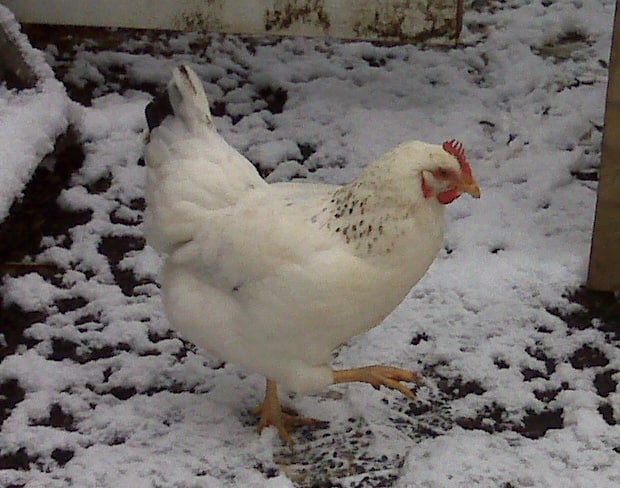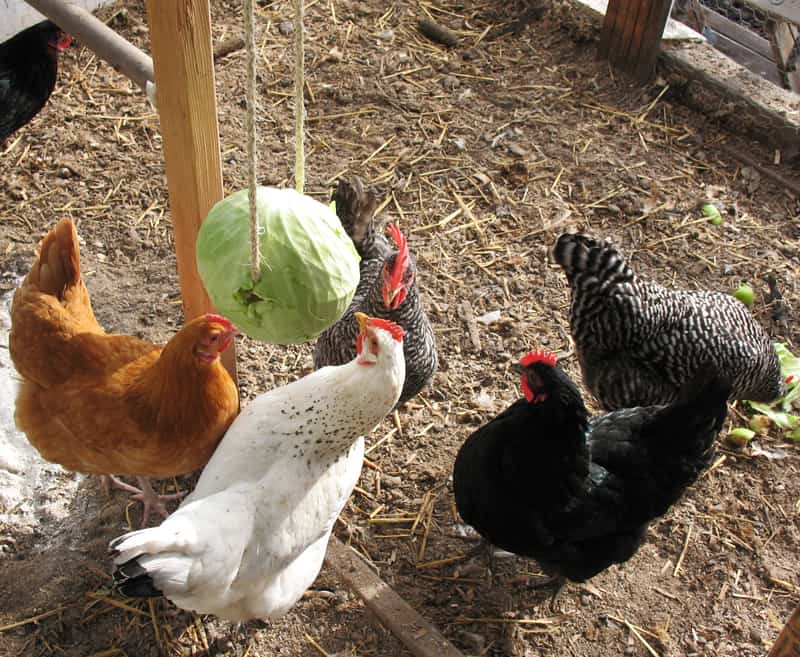 Many chickens are bred to be hardy in the winter. But even the ones that aren’t still come with their own down coat. It’s often harder on them to try to stay cool enough in the summer than warm enough in the winter. Still, there are precautions to take as winter sets in to keep our hens comfortable and safe through the long, cold winter.
Many chickens are bred to be hardy in the winter. But even the ones that aren’t still come with their own down coat. It’s often harder on them to try to stay cool enough in the summer than warm enough in the winter. Still, there are precautions to take as winter sets in to keep our hens comfortable and safe through the long, cold winter.
To help your chickens through the cold winter weather, I’ve put together a list of ideas that might help:
Add Light
If you live in extreme climates, adding a heat lamp is a way to keep your chickens warmer. Besides taking the chill off the coop, your chicken’s egg production will increase (as chickens like to have about 14 hours of daylight for optimal egg laying conditions).
However, I need to insert word of caution here. A couple years ago, two chicken coops in my area caught on fire the same weekend due to heat lamps in their coops. Apparently the temperature for the fixtures of those lights can get as high as 500 degrees. The fire fighter interviewed in the article about the coop fires (who helped put the fires out) said that a 100 watt lightbulb should do the trick for most city coops with small flocks and they aren’t as dangerous as a brooder lamp because they don’t get as hot. Here’s the article if you’d like to read it.
(A full-on regular light will be disrupting to your flock as they try to sleep, so make sure you use a colored bulb (preferably red). Another nice benefit of red lights is that it has a calming affect on chickens, which helps in the peaceful co-existance during those long winter days when they are cooped up more than they might be used to.)
If you decide to go the heat lamp route, a neat little thing you can add to your coop (for less than $20) is a controlled outlet . This automatically turns your light on when the temperature dips below 35, and turns it back off when it gets above 45.
Add Insulation
Chicken coop insulation can be as easy (and cheap) as sheets of foam or cardboard. I insulated my coop using scraps of leftover foam insulation from the cull bin at my local home improvement store. It cost me less than $25 to insulate my entire coop this way. If using insulation, remember to cover it up. Chickens love to peck at anything. Insulation isn’t good for them to eat. But, it does help keep them warm.
Add Extra Bedding
In the winter months, add extra bedding to the coop and nest boxes. If you live in a cold region, add extra straw. If you live in a warmer region, add extra wood shavings or wood pellets (I use a combination of wood shavings and wood pellets and it seems to work great).
Many large-scale farmers don’t go to the extra work to pamper their chicks but small-flock farmers need to remember that a handful of chickens produce much less collective body heat than a large flock of 50 or more chickens. (You can tell if your chickens are cold if they fluff their feathers and stand on one foot. They’re trying to stay warm.)
Patch up Holes
If your coop is drafty or has lots of open spaces, consider covering some of them up for the winter. Just don’t cut off all their ventilation because they still need some fresh air.
In my coop, I have a section of the floor in the back that I keep open during the summer (it’s covered with wire so other animals can’t break in). During the winter, I cover most of that section with wood to keep the heat in. There are also vents along the top of the coop to keep air moving.
Add Plastic

Chickens don’t like to be wet or hang out in the wind. Adding plastic (or a tarp or a shower curtain, etc.) to the outside of the chicken run will cut down on those things significantly. I use a roll of 7ml clear plastic (so the sun can still shine through) and staple it up on 2 of the 3 walls of the chicken run. I leave one wall uncovered so the girls can see out and get fresh air. This solution costs me less than $10. I strategically cover the walls of the run that have the cold east wind blowing right down on them, and leave the open side the one facing away from the wind entirely.
P.U.P.
Yes, this is an acronym for doggie poop patrol, but it works for chickens too. Pick Up Poop. Don’t neglect cleaning the coop out in the winter. Chickens tend to stay indoors more when it’s cold, and if you close up the coop more than it is in the summer, all that smell can start to bother your chicken’s lungs. A sanitary chicken environment is a must.
Keep Water Drinkable
If freezing water is a problem where you live, consider getting a heater for the water. They actually make heaters for chicken water containers. Tuck it inside your water container, or sit the container on top (depending on the style you get) and it will keep your chicken’s water from freezing. You can do something similar with a heated dog water dish (which is actually a cheaper option).
Add Entertainment

Chickens need exercise. In the winter they’ll be more likely to hang out in the coop, so give them incentive to exercise. Throw cracked corn or other grains into the chicken run and let them scratch around for it. (An added bonus of giving your girls cracked corn in the winter is that it heats up their body temperature. I especially like to give them a bit before bedtime to help them stay warm and cozy at night.)
Another idea is to put their food and water containers at opposite ends of the coop so they have to walk from one place to the other to eat and drink.
From time to time, I also hang a head of cabbage from a rope, or get one of those flock blocks for them to peck on. Both of these solutions give them something different to do, and give them snacks at the same time.
And, of course, if you live in an area where you can do it, let them out of the run for periods of leg stretching and exploring. Because I live in the Pacific NW and it rains almost non-stop, it sometimes gets tricky to allow the girls significant time outside (they’re used to at least 10 hours a day of yard time in the summer). But, even here, there are breaks in the weather and the girls enjoy their daily recess. The rain doesn’t bother them unless it’s heavy (however, give them snow and they won’t step foot outside the run…not even with bribing) and they’re smart enough to get out of it if it gets too much for them.
Pay Attention
Winter is a time when our hens, just like the rest of us, are susceptible to increased sickness. Take time each day to check on them, paying attention to any behavior changes. If you get a sick hen, immediately isolate her from the rest of the flock to help keep the illness from spreading.
 Most backyard chicken owners have small flocks they know by name. This makes it easier to spot problems and be proactive with them when you take time to interact with them on a regular basis. Your girls will tell you if something is amiss. If they’re too cold, they will fluff their feathers and stand on one foot when they’re trying to stay warm. If they’re bored and grouchy they might be picking on each other more. If they’re not feeling well, there’s many signs that will give you a clue.
Most backyard chicken owners have small flocks they know by name. This makes it easier to spot problems and be proactive with them when you take time to interact with them on a regular basis. Your girls will tell you if something is amiss. If they’re too cold, they will fluff their feathers and stand on one foot when they’re trying to stay warm. If they’re bored and grouchy they might be picking on each other more. If they’re not feeling well, there’s many signs that will give you a clue.
And the fortunate thing for us city chicken people is that our flocks are small enough to pay attention. And we’re so smitten with them, we’re willing to take extra measures to make sure they weather the winter just fine.